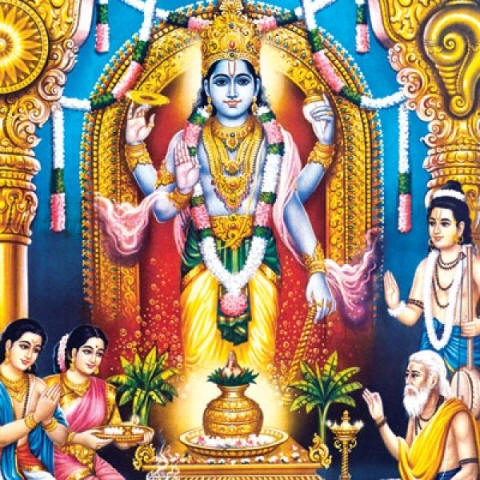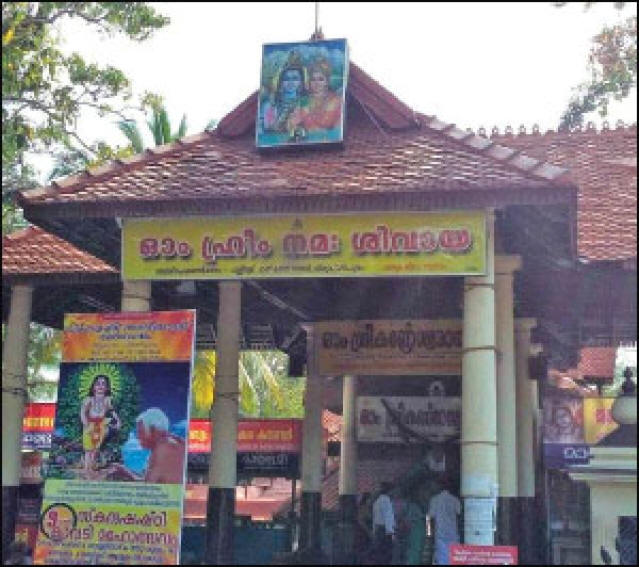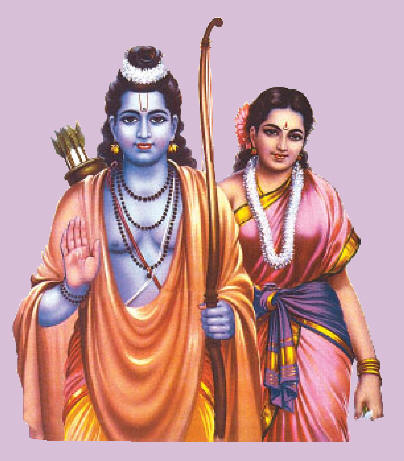GMS = Give Me Sakthi.
SNV = Satyanārāyaṇa Viratam
Published:03 Jun 2019 8 PMUpdated:03 Jun 2019 8 PM
சக்தி கொடு! - 5
Vikatan Correspondent
வி.ஆர்.சுந்தரி V.R.Sundari (The Author)
சகலமும் அருளும் சத்யநாராயண விரதம்! (தொடர்ச்சி...)
Benediction Galore Satyanārāyaṇa Viratam (Continued)

2. One day, the king was doing Pūja on the riverbank. A merchant by name Sādhu was passing by, and offering his homage asked the king about the Virata rites. Becoming joyous at hearing the procedural details of observing Viratam, he took leave of the king, reached home and shared the information with his childless wife. They did not observe the Viratam immediately. They thought they will wait until after the birth of the first child. They had their first girl child, whom they named Kalāvathi and raised her with tender loving care.
3. The daughter came of age and married. But the parents did not perform Satyanārāyaṇa Viratam. The merchant forgot the God and the Viratam. But God did not forget them and desired to set them in the right path and offer them grace and blessing. The God’s play began right earnest.
4. Once the merchant and his son-in-law Sundaram went to the city of Rathnasaram on business. The business went well. They noticed thieves carrying away the king’s treasure. The king’s guards were chasing them. The merchant and his son-in-law were walking in the opposite direction. Soon, the thieves threw the valuables at the feet of the pair and ran away. Mischief galore gave them a visitation!
5. The guards saw the merchant and the son-in-law standing with the stolen valuables at their feet and their eyes were red with fear, surprise and confusion. The guards hauled them before the king Chandrakethu, who put them in the jail.
6. A parallel misery was shaping up back home. The valuables at the merchant’s house were stolen. Lilavathy and Kalavathy became destitute with meager food and clothes. The relatives did not come forward to help them.
7. Unable to bear hunger, Kalavathy went out begging and on her rounds observed Satyanārāyaṇa Puja in progress. She went inside and her body tingled. She heard Viṣṇu’s stories and the greatness of Satyanārāyaṇa Viratam. Then itself, half of her penury left her. Once the Puja was over, she received Prasāda and came home.
8. She related this to the mother-in-law. Then only it struck on Lilavathy the infraction committed by her and her husband. She determined that she should observe Satyanārāyaṇa Viratam.
9. Lilavathy: “O Satya Nārāyaṇā! Please save us. My husband and son-in-law must return home soon. Please extend your grace and blessings. I will punctiliously observe Satyanārāyaṇa Viratam without fail.
10. She immediately got busy with her Viratam. She asked for and received willingly all the help for Viratam from the erstwhile unhelpful tight-fisted relatives. That evening itself, Lilavathy performed the Satyanārāyaṇa Viratam with devotion. Rejoiced Nārāyaṇar offered his grace and blessings.
11. Bhagavan gave his Darśan to the king Chandrakethu in his dream and said, “Maṉṉā! The two you imprisoned are innocent. Immediately release them.” The king was terrified, opened his eyes and jumped off the bed. At daybreak, he offered them freedom and let them go with gold and other essential materials. Maṉṉā = O king.
12. The merchant and the son-in-law travelled with fullness of satisfaction. Swamy tested them again. Half way on his journey, the merchant anchored his ship at a sea terminal and went ashore. Then Bhagavan came in the appearance of a Brahmana and asked them, “You both look like prosperous merchants. What goods do you have on the ship?”
13. The merchant saw him up and down and thought to himself, “He must be some unknown poor Brahmana. He is here to ask for alms. Do I have all this wealth on the ship to give him? Somehow, I must chase him out of here.”
14. The merchant addressed the Brahmana, “There is nothing on the ship that I can give you. Ordinary leaves are the cargo. You may leave now.”
15. The body of the Brahmana became red with anger. He said, “The ship’s cargo is a bunch of leaves. Let them be leaves.” The brahmana left their presence expecting no reply.
16. The merchant boarded the ship and to his shock, found a pile of leaves in the place of riches. The son-in-law realizing the cause quickly for this change, ran in search of the Brahmana with the father-in-law in tow.
17. They found the Brahmana on the seaside, fell prostrate at his feet and begged for forgiveness. Bhagavan graced them with his holy appearance. Bhagavan told them it was the failure of the merchant to perform the Satyanārāyaṇa Pūja that resulted in these adverse and unusual events. Because of the Grace of God, all the leaves morphed back into valuables.
18. The merchant soon reached his town. The news of his arrival reached the ears of his wife. She addressed the news bearer, “Here, this – Prasāda- is the grace of God. We will finish the Satyanārāyaṇa Pūja and go to my husband with Prasāda.”
19. Soon after the Pūja, mother and daughter left. Lilavathy in her hurry did not forget to eat the prasāda before her departure. But Kalavathy in her excitement to see her husband forgot to eat the prasāda before her departure. As soon as the Pūja is over, the observers must eat the prasāda. Bhagavan wanted to point out that fact. What happened?
20. Upon reaching the seashore, Lilavathy gave her husband the prasāda. Receiving it, his body tingled and ate the prasāda with devotion.
21. Lilavathy asked her husband, “Where is the son-in-law?”
22. “He is still on the ship”, said the merchant. The merchant took them to seashore to board the ship with them. There was no ship and no son-in-law.
23. Not seeing her husband, Kalavathy cried, sobbed and fell faint. All were unhappy. As if to dispel their unhappiness, a disembodied voice came loud and clear.
24. The disembodied voice addressed the merchant, “Though it is a golden vessel and even if the Nectar of Immortality flows into it, it will not stay in. Likewise, your daughter, upon completion of the Satyanārāyaṇa Pūja, but in a haste, did not eat the Prasāda. This is the consequence of that lapse. Firstly, ask your daughter to eat the Prasāda. Your son-in-law will appear before all.
25. Kalavathy immediately returned home, circumambulated the Swamy asking for forgiveness and returned to the seashore, the ship was there; so was the husband. With melting heart, the merchant along with his family worshipped and eulogized Satyanārāyaṇa and later returned home. With his family, he observed the Viratam according to the injunctions from then on. His family prospered. At ripe old age, the merchant received Mukti (liberation after death).
26. There is another story like this. King Tuṅgatvajaṉ lost his country and riches because he showed disrespect and contempt to Satyanārāyaṇa Pūja and the Prasada. Realizing his mistake, he supplicated to Perumal, performed Satyanārāyaṇa Pūja, worshipped Bhagavan and retrieved his nation and the riches. That was according to the sacred story.
27. On the day Satyanārāyaṇa Pūja is observed, hearing and narrating this story bring many auspicious things. Skanda Purāṇa states that in the evening at the moonrise and full moon, one should observe Satyanārāyaṇa Viratam and offer worship to Bhagavan. Those who cannot perform the Satyanārāyaṇa Viratam on the specified day for one reason or other, can observe it on Sunday, Monday, Friday, Amāvācai (the dark new moon day), Ashtami (8th Lunar day), Dvādasī (12th Lunar day), Saṅkarānti (Beginning of a month), Dīpāvaḷi (Festival of Lights) or a Saturday in Puraṭṭāsi month (17th Sep-17th Oct). On the morning of Viratam, ritual ablution, decoration of prayer room with flowers, offering flowers and Naivēttiyam to Satyanārāyaṇar, narrating the Viratam stories, sing the panegyrics and worship Bhagavan. This wonderful worship offers s lofty life.
Will meet again.
--------------------------------------------------------------------------------------------------------------------------------------------------------------------------------------------------------------------------
கல்யாண வரம் தரும் நிர்மால்ய The remains of an offering made to a deity தரிசனம்!

1. In Thiruvananthapuram near the Śrī Padmanābha Swamy Temple, there is a Śiva Temple at Śrī Kāṇdēsvaram. Fifth century religious literature has a few references to this temple.
2. Tiruvithāṅgūr Samasthāṉa kings worshipped here besides other temples. The early morning Nirmālya Darśan is special. As soon as the front doors are open early in the morning, Nirmālya Darśan of 20 minutes duration takes place: The ceremonial change of idol’s garlands and flowers from the day before, cleaning and purification. Change = removal of the old garlands and flowers and application of new garlands and flowers. The devotees assemble to witness the event: Nirmālya Darśan.
3. Forty-one days of continuous witnessing of Nirmālya Darśan, the tradition says, will fructify the desires of the heart. Likewise, the spinsters will get married after the successful removal of impediments, if they witness the Nirmālya Darśan for a continuous 21-day period.
S.S. Mani, Tiruvananthapuram-36
--------------------------------------------------------------------------------------------------------------------------------------------------------------------------------------------------------------------------
The merit that rejuvenated the wings.

1. Hanuman, Aṅgathaṉ, Jāmbhavāṉ and others went south searching for Sītadēvi and were talking about Jatāyu’s death. Hearing it, a wingless eagle cried. Hanuman and others asked the eagle the reason for its cry.
2. “My name Sampāthi, the older brother of Jadāyu. When we were young, we challenged each other who would fly the highest. Jadāyu flew so high, and so distressed from the unbearable heat of the sun.”
3. I flew higher than Jadāyu, spread my wings and provided him a shade. The heat of the sun burned my wings. Because of it, I took a plunge and fell here. I cried having heard the news from you that my brother died from wounds caused by Ravana. Sampāthi said, “I saw Ravanan abduct Sītā.” Soon, he crawled to the top of the mountain and saw Laṅkapuri with his sharp eyes.
4. Sampāthi observed, “Sīta is in a forest in Laṅkā, guarded by four Rākṣaṣis. Soon, new wings grew on the sides. In the service of Rāma, the merit of a mote of help helped in the regeneration of its wings.
Parimalam, Tiruchi-21